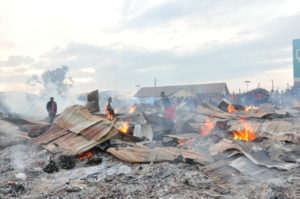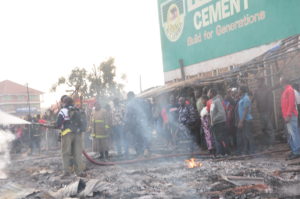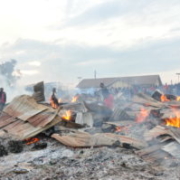Popular Mbarara market burns down, arson suspected
Several traders who lost their merchandise in the Saturday July 11 conflagration that engulfed Nyamityobora market suspect that the popular market was deliberately torched by motivated individuals, despite the police’s insistence that the cause of the fire is as yet unknown.
Located at Mile Two on Mbarara-Masaka road, the iconic Nyamityobora market- sometimes named Kijungu- is one of the sights that welcome you into Mbarara Town.
Vendors in Nyamityobora Daily Market were left in tears after an abrupt fire gutted the iconic market and destroyed property worth over Shs 500m.
The fierce blaze started in the wee hours of the night and destroyed a lot of property including tonnes of dry and fresh food stuffs, stalls, clothes, shoes and several eateries within Kijungu cell, Nyamityobora division, in the new Mbarara City
Nyamityobora market Chairperson, Wilson Rwamukore, confirmed that a total of 600 registered traders had lost property worth Shs 500m, including the market office.
“It has 600 traders and property worth Shs 500 million had been lost; even my money and books were burnt in the office. I was informed at 4 am, and and by the time I reached here, the entire market had been burnt,” Rwamukore said.
Byansi Muhammad, the area councillor representing Nyamityobora ward regretted that the unfortunate incident happened during the COVID-19 lockdown.
“It is unfortunate our market has got burnt during a bad time of COVID-19 when people were no longer working as their businesses were all locked down,” Muhammad said.
Arson suspected
Several traders who spoke to theCooperator expressed their suspicion that the fire that destroyed their livelihoods was no accident.
Ketty Rukundo, who for the past eight years has operated a hotel in Nyamityobora market, told theCooperator that she learnt about the inferno by phone call early Saturday morning.
“It was around 5:00am when I was called by a colleague saying, ‘You are sleeping and yet the market is burning?’ By the time I reached there, I could not save anything- everything had been burned; I simply broke down,” Rukundo says.
Rukundo believes the fire was planned by some market leaders who had earlier suggested developing a standard Nyamityobora market, while Wilson Rwamukore, the market Chairperson, blamed the tragedy on “enemies of the market”.
“It was torched by some enemies of the market, but we shall wait for the police investigation report,” he said.
Councillor Byansi Muhammad was equally shocked by the timing of the fire outbreak.
“If the fire was from a charcoal stove, the market would have got burnt around 11pm. But now, with this fire of 5 am, we really don’t know,” Muhammad mused.
For his part, Lawrence Birungi, a trader whose posho store was torched in the conflagration, says the fire’s outbreak during curfew time makes it even more suspect.
“We leave the market at 6 pm because of the curfew, so we were are surprised to learn that the fire that destroyed our businesses started between 4-5 am when there are no boda bodas operating. Some of us think this fire was planned.”
The widely held suspicions of arson are fanned by the narrative of the fire’s genesis and progression provided by Brian Semanda, one of the security personnel at the market. According to him, the fire was set from different corners of the market.
“The fire started in the middle of the market, but by the time we got there, another side of the market had also started burning. This means the fire was intentionally set by some unknown people,” Semanda said.
Police response
ASP Samson Kasasira, the Rwizi regional police mouth piece, says the cause of the fire hasn’t been established yet but investigations are still ongoing.
However, many blamed the police for not acting fast enough to stop the fire, despite the market having Nyamityobora police post for a neighbour.
“How can our market get burnt from left, right, to centre, when there is a police station next door? So we blame the government because they didn’t offer any help until we made an alarm to the central police station. And even when they came, the fire van had no water and we had to put out the fire ourselves,” one Saidat Rukundo charged.
But Kasasira says the police had responded in time to save a significant part of the market.
“Today morning fire gutted Nyamityobora market. It is said to have started at 4 am, and our fire rescue team was able to respond and put out the fire, saving half of the market and the neighbouring structures,” he said.

Nevertheless, he admitted that the police don’t have enough resources to man all the police units in order to cater for such disasters.
Appeal for restitution
One of the affected traders, Ketty Rukundo, appealed to government to support the traders to recover from the fire loss.
“We only recently resumed work, after the lock down, and this has happened. If government could help us to reconstruct our structures and pay our loans so that we can cater for our children, it would be a big help,” she said.
Others like Byansi Muhammad appealed to the president to come to the rescue of the vendors who were already affected by COVID-19.
“This is a double pandemic to the traders’ entire household income. I appeal the office of the disaster and preparedness to come and help them,” Muhammad said.
He adds that some of the traders had loans in different banks and requested that their payment be rescheduled,
“I don’t think these people will be able to clear in time; they should be added some time.”
Mbarara Deputy Town Clerk, Richard Mugisha says as the City Council they will deliberate and consider how best to help the traders.
“It would be premature for me to say what we as a council are going to do for the affected vendors, since this has just happened. We shall have a meeting on Monday with our political leaders, make an assessment of the extent of the damage, then come up with a clear plan on how to help them,” he told theCooperator in an interview, Saturday.
“But we also appeal to the other relevant central government offices especially the disaster management department to see how to come in and help our traders,” he added.
COVID-19 effect
Trader, Lawrence Birungi, says the COVID-19 restrictions on mobility had hampered traders’ ability to reach the market in time to save some of their property after they got news of the fire outbreak.
“Even if we wanted to rescue our property we were not allowed by police to move because of the curfew. Moreover, even bodabodas which are the easiest means of transport were stopped from carrying passengers because of COVID-19,” he lamented.

In addition, Mugisha, says the COVID-19 restrictions have dampened business performance of the former Mbarara Municipality.
“Most of those businesses have not been paying our local revenue since they were not working, and up to now they are yet to get to full capacity because of social distancing and the curfew,” Mugisha explained.
He adds that levies on some businesses had to be slashed in response to the slowdown in business.
The Deputy Town Clerk says the market was especially affected because, prior to curfew, some traders used to operate up to midnight while markets like Nyamityobora that were known to operate for up to 24 hours are no longer working.
“COVID-19 affected our revenue levies substantially. As council, we estimated that the impact of COVID-19 on businesses was 80%, and therefore we reduced the payment for those which are still operating by an 80% margin as well.”
Disaster-proofing city structures
Mugisha says the new Mbarara Central region market has been installed with fire extinguishers to cater for such disasters in the future.
“Yes we have the fire mitigation measures already in place for the new central market construction,” he said.
However, he opined that such disastrous challenges sometimes emerge from reckless traders who don’t provide security for their businesses.
“Yes we can mitigate but the fire could have come from a candle or out of carelessness caused by some people within the market.”
The post Popular Mbarara market burns down, arson suspected appeared first on The Cooperator News.

